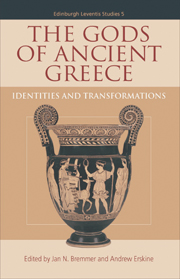Book contents
- Frontmatter
- Contents
- Preface
- List of Illustrations
- Notes on Contributors
- List of Abbreviations
- Introduction: The Greek Gods in the Twentieth Century
- 1 What is a Greek God?
- PART I SYSTEMATIC ASPECTS
- PART II INDIVIDUAL DIVINITIES AND HEROES
- PART III DIACHRONIC ASPECTS
- 14 Early Greek Theology: God as Nature and Natural Gods
- 15 Gods in Early Greek Historiography
- 16 Gods in Apulia
- 17 Lucian's Gods: Lucian's Understanding of the Divine
- 18 The Gods in the Greek Novel
- 19 Reading Pausanias: Cults of the Gods and Representation of the Divine
- 20 Kronos and the Titans as Powerful Ancestors: A Case Study of the Greek Gods in Later Magical Spells
- 21 Homo fictor deorum est: Envisioning the Divine in Late Antique Divinatory Spells
- 22 The Gods in Later Orphism
- 23 Christian Apologists and Greek Gods
- 24 The Materiality of God's Image: Olympian Zeus and Ancient Christology
- PART IV HISTORIOGRAPHY
- Epilogue
- Index
14 - Early Greek Theology: God as Nature and Natural Gods
from PART III - DIACHRONIC ASPECTS
Published online by Cambridge University Press: 05 August 2013
- Frontmatter
- Contents
- Preface
- List of Illustrations
- Notes on Contributors
- List of Abbreviations
- Introduction: The Greek Gods in the Twentieth Century
- 1 What is a Greek God?
- PART I SYSTEMATIC ASPECTS
- PART II INDIVIDUAL DIVINITIES AND HEROES
- PART III DIACHRONIC ASPECTS
- 14 Early Greek Theology: God as Nature and Natural Gods
- 15 Gods in Early Greek Historiography
- 16 Gods in Apulia
- 17 Lucian's Gods: Lucian's Understanding of the Divine
- 18 The Gods in the Greek Novel
- 19 Reading Pausanias: Cults of the Gods and Representation of the Divine
- 20 Kronos and the Titans as Powerful Ancestors: A Case Study of the Greek Gods in Later Magical Spells
- 21 Homo fictor deorum est: Envisioning the Divine in Late Antique Divinatory Spells
- 22 The Gods in Later Orphism
- 23 Christian Apologists and Greek Gods
- 24 The Materiality of God's Image: Olympian Zeus and Ancient Christology
- PART IV HISTORIOGRAPHY
- Epilogue
- Index
Summary
Les autres religions, comme les païennes, sont plus populaires, car elles sont en exterieur; mais elles ne sont pas pour les gens habiles. Une religion purement intellectuelle serait plus proportionnée aux habiles; mais elle ne servirait pas au peuple.
Blaise Pascal, Pensées no. 252Philosophers stretch the meaning of words until they retain scarcely anything of their original sense; by calling ‘God’ some vague abstraction which they have created for themselves, they pose as deists, as believers, before the world; they may even pride themselves on having attained a purer and higher idea of God, although their god is nothing but an insubstantial shadow and no longer the mighty personality of religious doctrine.
Sigmund Freud, The Future of an IllusionThe present chapter does not survey the whole of Greek theology, or even all of early Greek theology. Rather, in keeping with this book's theme of ‘identities and transformations’, I want to ask: how much of the Olympians do the first Greek philosophers retain in their world-systems? The answer, of course, is not straightforward, for reasons it will be the purpose of this chapter to explore.
- Type
- Chapter
- Information
- The Gods of Ancient GreeceIdentities and Transformations, pp. 273 - 317Publisher: Edinburgh University PressPrint publication year: 2010

